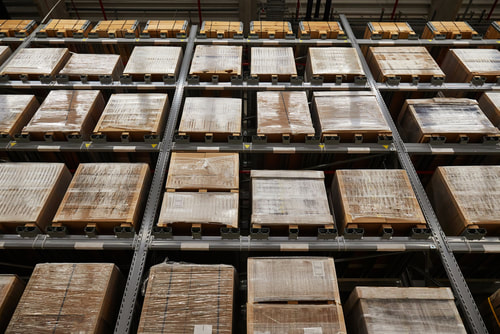|
Amazon's Fulfillment by Amazon (FBA) program allows third-party sellers to store their products in Amazon's warehouses and have them shipped directly to customers through Amazon's platform. While FBA can provide a number of benefits to sellers, such as access to Amazon's vast customer base and logistical infrastructure, there is one aspect of the program that has raised concerns among some sellers: commingling inventory. Commingling inventory refers to the practice of mixing identical products from different sellers in Amazon's warehouses. For example, if two different sellers are selling the same brand of headphones, Amazon may store both sellers' inventory together in the same bin. When an order is placed for that product, Amazon will choose which seller's product to fulfill the order from based on a variety of factors, such as proximity to the customer and inventory levels. Advantages of Commingling FBA InventoryThe advantages of commingling inventory to sellers are lower shipping fees and, with inventory commingling it is quicker and easier to label and send in products to Amazon FBA fulfillment centers. Disadvantages of Commingling FBA InventoryHere's how it works: let's say that Seller A sends in a shipment of headphones to Amazon's warehouse. Seller A's headphones are genuine and in good condition. However, Seller B, who is also selling the same brand of headphones, sends in a shipment of counterfeit or defective headphones. Because Amazon is commingling inventory, there is a chance that Seller A's headphones could get mixed up with Seller B's defective or counterfeit headphones. If a customer receives one of Seller B's defective headphones, they may leave a negative review or file a complaint with Amazon, which could result in Seller A's account being suspended or even terminated. The problem with commingling inventory is that it makes it difficult for sellers to prove that they are not responsible for any defects or inauthenticity in a product that a customer receives. Even if Seller A can prove that their headphones were genuine and in good condition, Amazon may still hold them responsible for any defects or inauthenticity if the product was fulfilled from a bin containing both Seller A and Seller B's inventory. This is particularly problematic for sellers of branded products, as they may be subject to legal action by the brand owner if their products are found to be counterfeit or inauthentic. If a seller's account is suspended or terminated due to false accusations of selling counterfeit or defective products, it can have a devastating impact on their business. Sellers Should Opt Out of ComminglingTo avoid these issues, some sellers choose to opt out of commingling inventory and instead have their products fulfilled only from their own inventory. However, this can lead to longer shipping times and higher fees, which can put them at a competitive disadvantage. Key Takeaways n summary, Amazon's commingling inventory can have serious implications for FBA sellers who are wrongfully accused of selling defective or inauthentic products. While the practice may improve efficiency, it can also make it difficult for sellers to prove their innocence in the event of false accusations. Sellers should be aware of these risks and take steps to protect themselves, such as opting out of commingling inventory or closely monitoring their inventory and customer feedback. If you have issues of Amazon accusing you of inauthentic or defective products, do not hesitate to call, email or chat with us for a free consultation on how to resolve the issue.
Comments are closed.
|
|
- Reviews
- Amazon News
-
Our Services
-
Amazon Appeals| Reinstate Account
>
- Amazon Appeal Inauthentic Item Suspension
- Amazon Appeal ODR Suspensions
- Amazon Related Account Appeals
- Appeal Amazon Verification Suspension
- Amazon Restricted Product Appeals
- KDP and ACX Termination Appeals
- Merch by Amazon Termination Appeals
- Amazon Drop Shipping Policy Appeals
- FBA Reimbursement Abuse Suspensions| Appeals
- Amazon Relay Suspension Appeals
- Amazon Safety Complaint Appeals
- Sales Velocity Suspension Appeals
- Amazon Sales Rank Manipulation Appeals
- Amazon Price Gouging/Fair Pricing Suspensions Appeals
- Amazon Review Manipulation Suspension Appeals
- Amazon Variation Abuse Appeals
- Amazon Forged or Manipulated Documentation Appeals
- Amazon Listing (ASIN) Removal? Reinstate Listing
- Amazon Seller Fraud or Illegal Activity Deactivation Appeals
- Amazon Account Hacked Suspension Appeal
- Amazon Funds Appeal
- How to Open Multiple Amazon Seller Accounts
- How to Settle Amazon TRO and Release Funds
- How to Settle Proposition 65 Cases and Release Funds
- Amazon Arbitration Lawyers Sue Amazon and Win
- Amazon Brand Registry Support
- Amazon Intellectual Property Lawyers >
- LLC Formation for Amazon Sellers
- Ebay Suspension Appeals
- Walmart Suspension Appeal
- Appeal Closed or Limited PayPal Account
- Etsy Suspension Appeal
- Amazon Hijacker Removal Service
- Twitter Account Suspension Appeals
- Temu Seller Suspension Appeal
- TikTok Seller Suspension Appeal
-
Amazon Appeals| Reinstate Account
>
- Free Consultation
- About Amazon Sellers Attorney
- Amazon Suspension Prevention with Free Appeals
- Top Rated Patent Attorney | Free Consultation
- Terms and Conditions
CONTACT DETAILS:AMZ Sellers Attorney®
9350 Wilshire Blvd. suite 203 Beverly Hills, CA 90212 (Mailing Address) نتحدث العربية
Türkçe konuşuyoruz Nous parlons français 🇫🇷 Мы говорим по русски 🇷🇺 Se habla español 🇪🇸 我們說中文 🇨🇳 |
SERVICES:Amazon Appeals
Inauthentic Item Suspensions Multiple/ Related Account Suspensions Amazon Verification Suspensions Forged or Manipulated Documentation Defending Buyer Complaints Plan to Prevent Suspension Intellectual Property (IP) Law Reinstating ASIN Fraud or Illegal Activity Hacked Account Listing Hijackers DMCA Lawyers Amazon Arbitration |
PAYMENTS:We accept payments from all major credit cards and also by ACH transfer through BlueSnap. Our purchase currency is US Dollar (USD). Payments made through our site are secure.

|
AS REPORTED IN:
|
|
|
|
|
|
Copyright © 2024 AMZ Sellers Attorney ® All Rights Reserved. Privacy Policy


 RSS Feed
RSS Feed